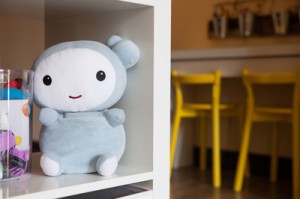Orlando Child Counseling & Orlando Play Therapy
Why Is Play Therapy Helpful For Children?
 Therapeutic play provides developmentally appropriate means of expression and communication for children suffering from various emotional challenges. It offers children the opportunity to express themselves at their own pace with the assurance that they will be understood and accepted. Because a child’s language development lags behind their cognitive development, a child will communicate awareness of what is happening in his or her worlds through play. Play therapy is to children what talk therapy is to adults. During the therapeutic play process children are able to directly access the right side of the brain which stores visual memories, and controls and stores emotions. Play Therapy is a medium for expressing feelings, describing experiences, exploring relationships, disclosing desires, and building self-esteem. Through play based counseling children are able to work through events and emotions, learn to identify their feelings, cope with them, and find solutions utilizing the creative process.
Therapeutic play provides developmentally appropriate means of expression and communication for children suffering from various emotional challenges. It offers children the opportunity to express themselves at their own pace with the assurance that they will be understood and accepted. Because a child’s language development lags behind their cognitive development, a child will communicate awareness of what is happening in his or her worlds through play. Play therapy is to children what talk therapy is to adults. During the therapeutic play process children are able to directly access the right side of the brain which stores visual memories, and controls and stores emotions. Play Therapy is a medium for expressing feelings, describing experiences, exploring relationships, disclosing desires, and building self-esteem. Through play based counseling children are able to work through events and emotions, learn to identify their feelings, cope with them, and find solutions utilizing the creative process.
More About Play Therapy
Play therapy is a process that allows a child to use play to work through thoughts and feelings and learn to cope with them without having to verbalize. Children often lack the ability to formulate words for their thoughts and feelings due to their developmental age. Play therapy allows mental health practitioners, to assess and understand children’s play and to help children cope with difficult emotions and find solutions to problems. Play therapy allows children to express their feelings related to problems, and find resolutions in their own way.
Play therapy modalities used most at GroundWork Counseling include doll house play, dress up, clay, art, painting, drawing, and use of various toys such as dolls, Legos, and cars. Toys like Legos, Play-Doh and stacking and nesting materials help develop a child’s fine motor skills. The “dress-up” area in the play room includes clothing, dolls and props such as hats and bags that encourage young children in playing “make-believe” and allows the child to make sense of the grown-up world. Research has shown that children who are active in pretend play are usually more joyful and cooperative, more willing to share and take turns, and have larger vocabularies than other children.
Play therapy sessions in Groundwork Counseling’s bright and cheery playroom are usually held weekly, and the number of sessions depends on the child. Research suggests that it takes an average of 20 play therapy sessions to resolve the problems of the typical child referred for treatment, however this can be more or less depending on the unique needs of each child. Some children may improve much faster while more serious or ongoing problems may take longer to resolve. The counselor will then check in with the child’s parent periodically do discuss themes, progress, and how they can help foster positive change at home.
Play therapy helps children:
• Express feelings, emotions and troubling thoughts
• Develop appropriate coping skills
• Develop self-confidence and trust in others
• Define healthy boundaries
• Create healthy bonding in relationships
• Become responsible for behaviors
• Develop new and creative solutions to problems
• Develop respect and acceptance of self and others
• Cultivate empathy and respect for thoughts and feelings of others
• Learn new social skills and relational skills with family
The positive relationship that develops between the therapist and child during play therapy sessions can provide a corrective emotional experience necessary for healing and finding solutions. Play therapy and child counseling may also be used to promote cognitive development and provide insight about and resolution of inner conflicts or unhelpful thinking in the child.
Who Provides Play Therapy?
The field of play therapy is growing and is represented by the Association for Play Therapy, an international professional organization. The practice of play therapy requires extensive specialized education, training, and experience. A play therapist is a licensed mental health professional who has earned a Master’s or Doctorate degree in counseling, psychology or social work with considerable general clinical experience and supervision.
The play therapy process allows children to consider new possibilities that are not possible in reality, and helps to greatly expand self-expression. In the safe environment of the GroundWork Counseling play therapy session, children are able to explore unfamiliar concepts as he or she plays out feelings, bringing them out in the open and learning how to control them. A major function of play therapy is the changing of what may be unmanageable in reality to manageable situations through symbolic representation, offering children opportunities for learning to cope.
Children may have considerable difficulty trying to tell what they feel or how their experiences have affected them. In the presence of a caring and empathetic adult facilitator, a child will reveal inner feelings through the toys and materials they choose, what they do with the toys and materials, and the stories they act out. Play therapy at GroundWork Counseling provides the child with fun and safe opportunities to live out experiences and feelings, allowing the therapist to experience the child’s inner world and providing growth and healing for the child.
Benefits of Play Therapy
Play therapy is the primary intervention used for anger management, anxiety, depression, dealing with grief and loss, family issues or divorce, trauma, difficulties with sleeping and nightmares, acting out and aggressive behavior, academic and social developmental, physical and learning disabilities and conduct disorders. Play therapy is also used for ADHD / ADD, Autism or Pervasive Development Disorder (PDD).
Play therapy has also been demonstrated to be an effective therapeutic approach for abuse, attachment difficulties, illness, grief, life transitions (divorce, moving, etc), and children with emotional challenges. The aim of play therapy is to decrease behavioral and emotional difficulties that interfere significantly with a child’s normal functioning.
Ready To Make A Change?
GroundWork is proud to offer both in-person &
virtual Telehealth appointments.
In-Person Sessions: Central Florida
Virtual Sessions: Florida, Maine, South Carolina, Montana, Vermont





















